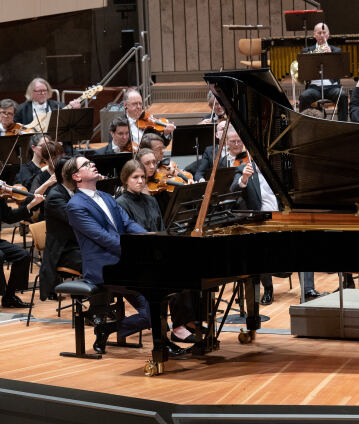Santtu-Matias Rouvali and Víkingur Ólafsson

John Adams describes his piano concerto Must the devil have all the good tunes? as a “funky danse macabre”. Pianist Víkingur Ólafsson has chosen the energetic work for his debut with the Berliner Philharmoniker, with Santtu-Matias Rouvali, principal conductor of London’s Philharmonia Orchestra, on the podium. Also on the programme are Helix, by Composer in Residence Esa-Pekka Salonen, and Sergei Prokofiev’s Fifth Symphony.
In Esa-Pekka Salonen’s dazzling orchestral piece Helix, the name says it all: the cascades of sound that expand spatially can be described, in the composer’s words, “as a spiral or coil”. The piece begins slowly at the broad end of the cone and is subjected to a continuous process of acceleration as it works towards the tip. As the tempo increases, the note values of the phrases are lengthened to convey the sense of pressure that builds as the music seems to be pushed through an ever-smaller space – like toothpaste being squeezed out of a tube.
As a self-confessed ambassador of the music of his Finnish homeland, Santtu-Matias Rouvali has included Esa-Pekka Salonen’s serpentine piece in the programme. After his 2015 debut with the Berliner Philharmoniker with Jean Sibelius’s First Symphony, he returns with a programme characterised by rhythmic energy. The main work of the evening is Sergei Prokofiev’s Fifth Symphony, in which the composer brilliantly succeeds in combining advanced musical techniques with formal clarity and melodic simplicity.
Prokofiev wrote his Fifth in 1944 in the countryside – at an appropriate distance from the war raging in Moscow. The work was completed after only two months, allowing the premiere to take place in January 1945 at the Moscow Conservatory under the baton of the composer. Immediately before the concert began, the Soviet victory on the Vistula was announced – the mood in the hall was correspondingly euphoric. The symphony, which is characterised by humour and dance-like lightness as well as dark drama, also celebrated a victory – not, however, that of the Soviet troops, but, according to Prokofiev, the “triumph of the human spirit”.
© 2022 Berlin Phil Media GmbH
Related interview
Artists
Our recommendations
- Santtu-Matias Rouvali and Alice Sara Ott
- “Late Night” concert with Matthias Pintscher and the Scharoun Ensemble
- Andris Nelsons conducts Shostakovich’s Tenth
- Paavo Järvi and Emmanuel Pahud
- Andris Nelsons conducts Strauss’s “Alpine Symphony”
- Simon Rattle conducts symphonies between late Romanticism and Modernism